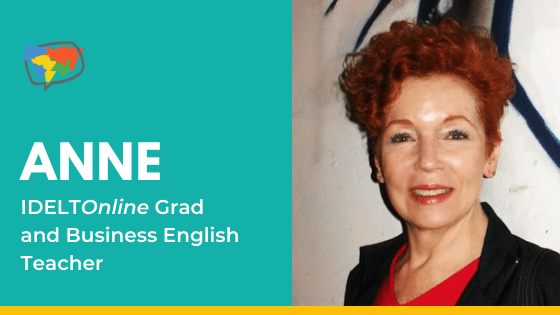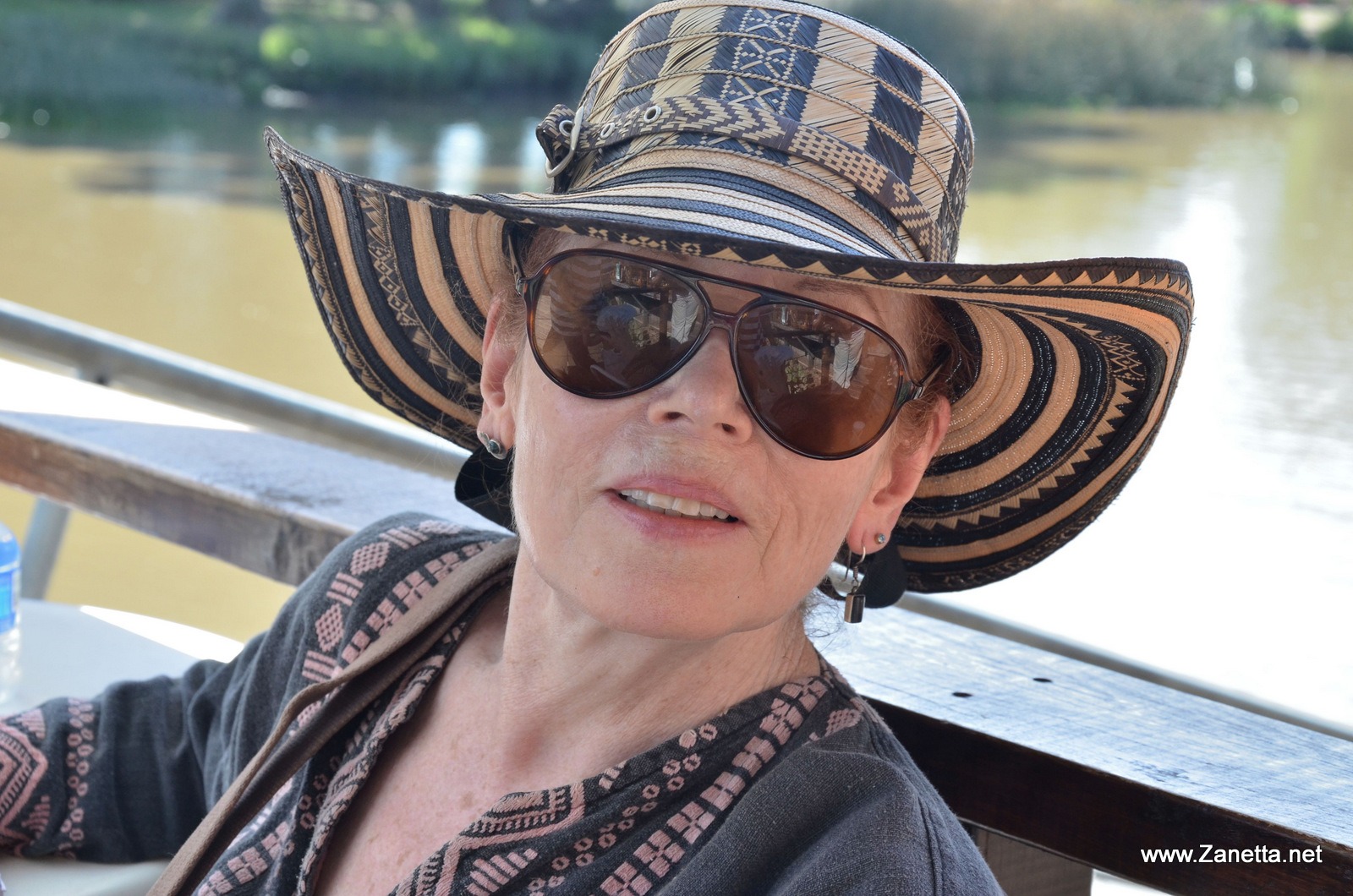Following an extensive career as a researcher, IDELTOnline grad Anne Usher de Ranson, from the U.K., got into English teaching and hasn’t let age, long commutes, nor the pandemic stop her from teaching ever since. Currently living in Argentina, she’s been giving Business English classes to adults and preparing teenagers for English proficiency exams. We asked her about working as an EFL teacher in retirement and how she’s strived for professional development to achieve her goals. (Scroll to the bottom of this article to watch the full video interview.)
Hi, Anne! Can you share a bit about yourself?
My name is Anna Usher. I’m retired — that’s the most I’m going to say about my age. I’m originally from Great Britain but I’ve lived in Latin America now for around 45 years. I’m a naturalized Venezuelan. My children were born in Venezuela, and I’m currently living in Argentina. I’m living in the area just at the edge of the Paraná Delta. If you cross the river out front, it’s marshland delta.
Discover the best places to teach English when you retire.
What was your career before teaching?
I started as a researcher, then I ended up as the COO of a regional consulting company. That meant that I was running a number of teams all over the region. The teams had to produce a certain amount of work in English — presentations and reports — so I was informally teaching them.
My English is of reasonably good level. A long time ago, I went to the sort of school that banged the grammar into you every day of the week and insisted on speaking properly. And I also did English and French literature and language to a scholarship level, so the command of my own language is reasonably good. What I needed was to learn how to teach because when I joined Bridge, I wasn’t a teacher.
What inspired you to teach English?
I wanted something to do. I’m not the sort of person who would sit around. I needed to earn a bit of money. And I went around a number of schools in Buenos Aires about six or seven years ago, and Bridge Argentina said to me, “Get your papers, and you’re on.” So, I started with Bridge Education Group here in Buenos Aires.
What do you like best about teaching in Argentina?
The people I meet are very interesting, very varied, and very opinionated. Is that an Argentinian thing, particularly? I don’t know. But I could get a class of adult students arguing, even among themselves, and I just throw a few things or scenes into the mix. They’re also lively — I don’t feel that I’m banging my head on a brick wall trying to get them to respond.
Alejandro, from Venezuela, is another EFL teacher in Argentina.
Can you tell us about your current teaching job?
I’m doing some work for Bridge and teaching some private students. Aside from Argentines, I’ve also got a couple of students in Colombia.
I have a couple of teenagers that I’m preparing for Cambridge exams, and I’m preparing a couple of young university students for IELTS exams. But most of my students are adults who are working, usually for multinational corporations. Now, when I was working, our clients were multinational corporations, so to a certain extent, I am seeing them through the mirror of the work that I used to do. I understand the corporate culture, and if they need help with things like making a presentation, writing a letter to the boss or a report, or even a bid, I can, apart from just teaching them English, help them with that.
Find out how you can start teaching IELTS exam prep.
How did you find your private ESL students?
Through word of mouth. People I’ve met locally tell their family and friends, then their family and friends tell their family and friends. I haven’t tried advertising yet, but I guess I will try advertising. What I haven’t decided is what to do and how to do it. A lot of people who freelance do it on Facebook. I don’t use Facebook and I don’t like it, but I’m certainly thinking of using maybe one of the online marketplaces.
Find out other ways of getting students as a freelance online ESL teacher.
How has the global pandemic affected you as an English teacher?
For a long time, I was traveling from here every day up to Buenos Aires and back, and that’s two hours minimum each way, five hours a day. And I’m not good at reading a book or a Kindle on the train, so I used to crochet. I crocheted everything that could possibly be crocheted — I even crocheted my slippers!
Now, of course, with the pandemic, I’m not traveling anymore, and I think probably that’s the way it’s going to be now. At least in our type of work, I think there’s a tendency now to teach English online. And that opens up new possibilities because you can teach people beyond your immediate area and you can teach people beyond your national boundaries.
Read how other global English teachers have adapted to the COVID-19 crisis.
Can you share an anecdote about a funny experience while teaching?
I had a couple of students from a national pharmaceutical company who had been chosen to go to India to implement a contract. They had five weeks, with three lessons a week with me, to get themselves ready to work in India, in Hyderabad, which is in the south. And they hadn’t done anything in English since school. They were scared, and I don’t blame them. And I was scared too because I couldn’t possibly get them up to the level of handling a contract in five weeks.
This was when I was winging it. We started off by eating Indian food. We looked at Indian films. We subscribed to The Times of India. We talked about Indian history, Indian culture, Indian accents — that’s a challenge for anybody. And we didn’t really do any English, but what I did by going around the subject with them was to get them to understand a little bit of what to expect and also to relax a bit. And by relaxing, what they knew started to come out.
Very often, adult students know more than they think they know. But all the experiences of life — all the things they’ve had to learn in university, getting a job, holding a job, kids, family — that all comes in on top. And what they’re not using on a regular basis kind of gets stuffed down to the bottom of the pile. So, I took that approach rather than sort of trying to bang them through a grammar book in a short period of time. And they went, and I think I was more anxious than them, but I didn’t like to show it.
When they came back, I asked, “How was it?” They said, “For the first two days, it was terrible. We couldn’t say a word.” And then they said something very strange. They said, “Then, it went swimmingly.” Now, that is not something they got from me. That is the sort of word you would expect an Indian to use because they have a different vocabulary. Their English is different.
You took the 150-Hour IDELTOnline™ course. How did you choose this course?
I was teaching people as I had learned to need to be taught learning a second language. However, I was winging it. And the pandemic gave me the time and the opportunity to take a qualification and get myself a little more organized. So, I sold my piano and took the IDELTOnline™ course.
I did the basic TEFL/TESOL course first. To be perfectly honest, we are told constantly that as you get older, your brainpower isn’t as good. And I wanted to see if I could do it. Then, I tried the big one, the IDELTOnline™. I can tell you that I was nervous. It’s like everything else. We pick up perceptions, other people’s perceptions, of how we should be, how we should behave, how we should think, how we should dress, and what have you. And in the same way that adult English students pick up the perception that “I’m only going to make a fool of myself. I’ve forgotten it all, and I won’t remember,” and all the worries that adult ESL students have, I was doing the same thing while taking a teaching qualification. Nevertheless, I did okay.
How did this course help you professionally?
What it did was act a bit like a psychiatrist. When people go to a psychiatrist, they know what’s wrong with them but what they can’t do is order their thoughts. So, the whole point of a psychiatrist is to help the person order their thoughts so they can sort their problems out. That’s what the course did for me with teaching. I had ideas from here, there, everywhere, but they were in bits. What the course did was help me bring my ideas together.
At the end of the course, you’re asked to produce a teaching philosophy. And I wrote, “Philosophy, no. This is a work in progress. I’m still learning.” I don’t call it a philosophy, but in a way, I suppose it is because I managed to bring all those bits together and get a clear vision of what I’m doing. But that doesn’t mean that I can’t learn more and I can’t do better. But I think I’m probably a much better, mentally organized teacher than I was.
Find out more about making an ESL teaching philosophy statement.
What’s next for you?
I want to teach people from other countries and other cultures, and, if possible, people who can pay me in hard currency because earning in pesos is a fool’s game. With inflation and devaluation, we suffer income compression, which is just a sweet euphemism. So, you have to work more and more hours every month to catch up on what you spent last month.
What I really want to do, but I’m not sure if it’s possible, is I’d very, very much like to do in-person teaching in the far East once the pandemic’s over. As a kid, I lived in that region and I’d like to go back.
Watch the full video interview with Anne:





